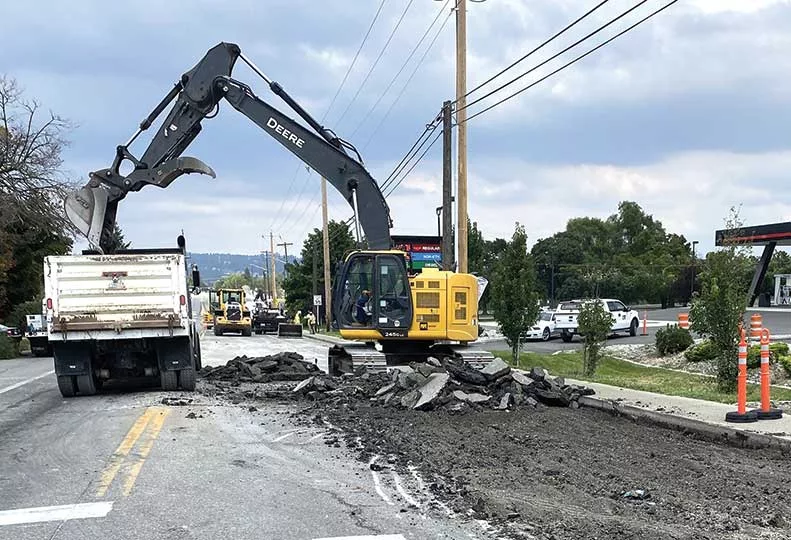Spokane Valley roads budget boosted with new fee
$20 vehicle registration tax will add $2.8M for projects in first 12 months

The city of Spokane Valley completed a $4.5 million reconstruction project at the intersection of Broadway Avenue and Park Road in 2023.
| City of Spokane ValleySpokane Valley residents soon will pay $20 more to register vehicles to help support preservation and maintenance of about 450 miles of roads in the municipality, says Bill Helbig, Spokane Valley community and public works director.
For 12 months, beginning in July, the new registration fees are expected to generate $2.8 million, based on a Washington state Department of Licensing estimate of 140,000 vehicles in Spokane Valley, Helbig says.
The new registration fees will help sustain the city's Pavement Management Program, which is responsible for pavement preservation and street-maintenance projects, says Adam Jackson, Spokane Valley utility engineering manager.
The city's plan is split in two areas of focus, pavement preservation and street maintenance, says Jackson. "Preservation is the blacktop that the cars are driving on and the maintenance is all the inner workings ... that lets people drive on those roads," he explains.
Pavement preservation typically involves hiring a contractor to restore, improve, or treat existing pavement to extend the life of the street, whereas street maintenance encompasses other aspects of upkeeping roads, such as snow plow operations, maintaining traffic signals and streetlights, sidewalks, potholes, and crack sealing, Helbig adds.
Many of the city's roads are relatively new and in decent condition, as the city itself is only 21 years old and road systems before the municipality was incorporated were aided by Spokane County, Jackson says.
While the Spokane Valley's roads generally are considered to be in good condition, in order to stay ahead of the expected degradation of main arterials, the city needed to generate a sustainable revenue source, which is why the vehicle registration tax was approved.
"In the grand scheme of the lifespan of a street, we're relatively on the young side," Jackson says. "Generally the (roads are) in good shape."
Helbig adds, "That's the whole purpose of the preservation program, to keep them that way because it's cheaper to do these preservation efforts than to let them go and have to reconstruct."
Without the funding, maintenance of local access roads would be overlooked in favor of arterials, according to a City Council report.
The pavement program needs an estimated $16 million annually, with $10 million for preservation projects and $6 million for maintenance activities to keep the streets in their current condition, the report states.
There's been a shortfall over the last five years, however, and the street-maintenance program has only been operating with an annual budget of about $8 million, resulting in about $5 million of local access projects going unfunded.
Additionally, a portion of street-maintenance funds are generated through a telephone utility tax that once generated about $3 million annually, but due to a decline in the use of landlines, that tax generated less than $1 million in 2023, says city communications manager Jill Smith.
The landline tax will remain in place to continue supporting the pavement program, she adds.
"That shortfall has been made up by general fund transfers," says Helbig. "We've been transferring the excess general funds into the street fund to help shore up the street fund."
General fund transfers have ranged between $908,000 in 2019 and have increased to $4.6 million budgeted in 2024, according to Transportation Benefit District funding data provided by the city.
Engineering officials currently are working on a list of road projects planned in 2024 that will be announced by March, Jackson says.
To help identify upcoming road projects, engineers use a variety of tools including a pavement-condition index to rank the overall health of a street from a low score of zero to a high rank of 100. Additionally, community feedback is taken into consideration, as well as opportunities to share costs and minimize with water and sewer service projects.
Even without the new vehicle tax in place, the city accomplished major road improvements last year, he says.
In 2023, the city completed the construction of the $25 million Barker Road corridor, that included the installation of new sewer and water mains, road widening, and a shared-use path, Jackson says.
Other notable projects recently completed in Spokane Valley include Eighth Avenue improvements to widen the road, update stormwater systems, and install new sidewalks and a bike lane.
At the Broadway Avenue-Park Road intersection, a $4.5 million reconstruction project has replaced pavement with concrete, installed a new sidewalk, and replaced the traffic signal system.
The municipality of Spokane Valley services about 450 miles of roads that cover over 1,900 acres of paved areas, 71% of which are local access streets and about 21% are arterial routes, according to a report on Transportation Benefit District funding presented to City Council in November 2023.
Engineering officials note that residents in Spokane Valley aren't the only ones to pay a tax to maintain roads.
"Almost 80% of all the cities in Washington have this funding source in place," says Helbig.


_c.webp?t=1763626051)

_web.webp?t=1764835652)
